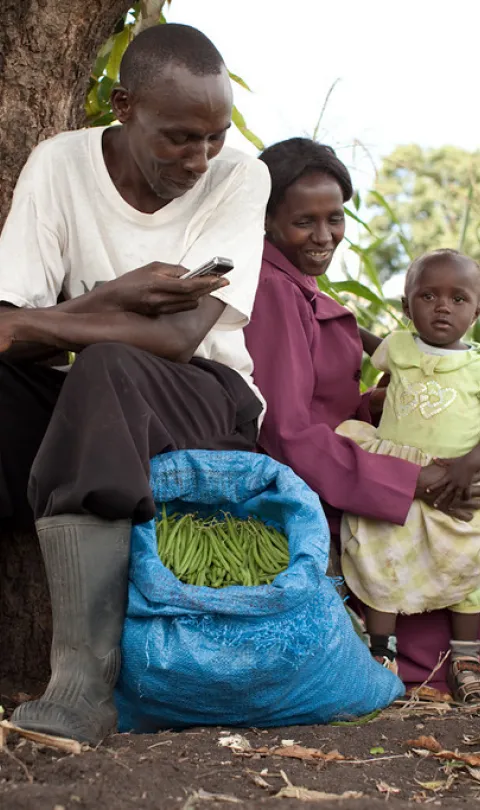With the adoption of the Sustainable Development Goals (SDGs) in 2015, world leaders agreed to tackle issues such as poverty, inequality, and climate change. Experts estimate it will take not billions, but trillions of dollars to achieve the SDGs on a global scale. Meanwhile, the data revolution is playing a pervasive role on our economies, governments, and daily lives. The SDGs brought this revolution front and center for the development community, as its 169 targets and some 232 indicators are creating massive data demands. There are huge opportunities to harness data to meet these demands, but low and middle-income countries struggle to do so, and financing to support development data remains appalling low at 0.3% of ODA. So as governments work to finance and implement the SDGs, how can – and perhaps more importantly, why should – we ensure more and better financing for data?
The OECD’s 2017 Development Co-operation Report, released in October, provides a timely and sophisticated analysis of the urgent need to improve data-driven development. The report highlights the potential benefits from bringing different data sources together and leveraging new technology to achieve the SDGs. It also warns of the risks. Contributors from PARIS21 and Open Data Watch shed light on the challenges core statistical systems face in developing countries, where limited capacity, resources, and leadership, together with poor institutional and governance frameworks prevent governments from taking advantage of the data revolution. A central take-away of the report is that despite the excitement for the data revolution, domestic and international investment has not kept pace. And worse – the way financing is allocated and used often leads to sub-optimal outcomes. Contravening aid effectiveness principles, donor priorities, rather than governments’ priorities and data demands, routinely drive assistance. In chapter 4 of the report, PARIS21 and Open Data Watch call for a revitalization of donor support for statistics, recommending diverse partnerships, alignment with national priorities, new data skills, and a focus on data use.
A recent independent evaluation of the World Bank’s support for data and statistical capacity building found many similar problems. According to the evaluation, support was most successful when channeled through financing instruments that can drive coordination, when aligned with national strategies, and when it takes a long-term, system-wide approach. The evaluation recommends exploring a global umbrella mechanism for long-term financing of data. To ensure sustainable funding from domestic sources, it also recommends elevating funding for data in the World Bank’s policy dialogue with client governments to promote evidence-based decision-making and demonstrate the value of using data.
At the Global Partnership for Sustainable Development Data, we are listening closely to our country partners. Senior officials in West Africa said in recent conversations that the budget allocated to ministries, departments, and agencies for data and statistics is too small to improve methodologies or expand capacity for collecting more relevant and disaggregated data. Others have reiterated the need to align funding with results, stating that recent donor investments in surveys were not sufficient in meeting data demands. Tapping into administrative sources and civil registration systems could provide complementary and sustainable sources of data.
As a catalyst and facilitator, we are exploring ways to broker support and forge creative partnerships to help countries implement against the priorities in their national data roadmaps. Following Ghana’s National Data Roadmap Forum in April, we helped the Ghana Statistical Service and Ministry of Finance bring together donors to discuss Ghana’s priorities for building a vibrant data ecosystem. At the High-Level Meeting on Data for Development in June, we worked with the governments of Kenya and Sierra Leone to ensure the donor community was engaged in the discussions, to increase support and foster greater communication and collaboration.
We have also been listening to donors. On the sidelines of the last World Data Forum, the Global Partnership, the UK Department for International Development, the Hewlett Foundation, and the World Bank co-convened a discussion around financing data with representatives from over 20 bilateral, multilateral, and philanthropic funding organizations. That discussion reinforced many of the challenges highlighted in recent reports from the OECD, the World Bank, the Sustainable Development Solutions Network, and others, and pointed to the lack of a strong evidence base for the value of investing in data as a major barrier to increased financing.
There is a rising chorus from major institutions and prominent thinkers arguing that data must become a strategic, cross-cutting priority for developing countries and donors alike, much like it has been in the business community for decades. We are eager to take this body of recommendations forward. Working with our partners who have deep expertise on financing issues and our country partners who experience these challenges every day, the Global Partnership is launching a program of work to push for more and better financing for data. It will include strengthening the evidence base on the value of investing in data. Building on the recommendations proposed by partners in recent reports, we will challenge donor behavior and build consensus around a new way of doing business that is validated by practical needs at country-level. And we’re going to advocate for more financing by exploring how to put a stronger emphasis on data in existing and new financing instruments.
If we are to convince those who control the financing, we need a clearer understanding of the return on data investments. But, showing value in the form of dollars and cents is not enough. We will also tell the human story, to show how far an investment in data will reach beyond the finance ministry and beyond the statistical office. By illustrating its potential for catalytic impact across every SDG, our argument will be clear: that better data leads to better decisions and ultimately better outcomes for real people, all around the world.
(Photo by Esther Havens)


